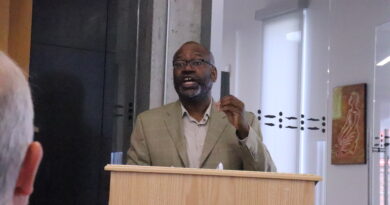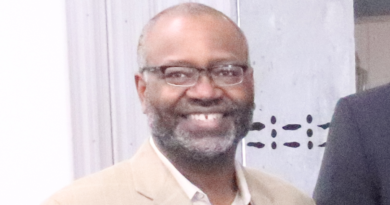Social work student collecting data about Black mothers’ experiences with child welfare system

A social work student in New Brunswick wants to interview Black mothers in Nova Scotia who’ve been involved with child welfare servces and the Department of Community Services for child neglect within the past five years.
Renise Robichaud is working on her masters thesis at Université de Moncton. She said Black mothers are overrepresented in the child welfare system and the main issue is the Department of Community Services relies heavily on people reporting parents to the offices of child welfare, which accounts for the majority of the cases they receive.
“It’s really hard in Nova Scotia to find our data on social welfare and social services,” Robichaud said in an interview with the Halifax Examiner. “There are no right or wrong answers. And I’m not here to judge anybody. I’m just trying to create some sort of data on it.”
Robichaud said the reasons people report parents are very subjective.
“Someone can say, ‘Well, you neglected your child,’ but someone was like, ‘No, it’s not neglect to me,’” she said.
“Some research in Canada and the US does say that depending on the perceived ethnicity, Black mothers are more likely to get reported to CPS, so there’s a racial bias as well.”
Importance of local data to Black communities
Robichaud said she decided to explore the issue of Black mothers in the welfare system because no local research exists. Any that does exist is from the US, with a smaller portion from Quebec and Ontario.
She said it’s difficult to make clear distinctions because despite similarities between Black Canadian and Black US cultures, there are also differences. That means the research doesn’t always translate to a Black-Canadian perspective.
“I wanted to maybe get that ball rolling so maybe some other people could be inspired to do more research on the subject,” she said.
Robichaud said it’s important to start conversations about physical data with respect to Black communities.
“It’s crucial if you want to make any advancement or anything like that,” she said. “So, hopefully, you start to open the doors and it gets to maybe people in higher positions to better serve the people that have those services and change some things.”
Cultural differences contribute to racial bias in child welfare system
Social worker Robert Wright is the executive director of the Peoples’ Counselling Clinic and the acting executive director of the African Nova Scotian Justice Institute. His background includes frontline child welfare and he is a former regional director for child welfare.
Wright said in addition to racial bias contributing to the overrepresentation of Blacks in the child welfare system, so too are issues of class and systemic racism.
“Think about it, if you’re arguing with your spouse in front of your child in an apartment, the chances are greater that someone’s going to hear it than if you’re arguing with your spouse in front of your children in your home in a nice neighbourhood where there’s at least 20 feet between you and the next house,” Wright said.
“Poor people live in greater population density than rich people do, therefore their deeds and misdeeds with their children are seen more often and are reported on more often. And Black people are overrepresented in those spaces.”

Wright said that the subject nature of the “complaints-driven system” means that cultural differences between Black people and white people also contribute to the racial bias and systemic anti-Black racism within the child welfare system.
“Nobody reports on a white person because (they’ve never) seen them hug their child,” he said. “If white people are not providing emotional support for their children, that will never be reported. But no matter how nurturing a Black mother is to her children, the fact that she yells at them will be reported.”
Culturally, he said Black parents are more likely to be both more verbally aggressive and physically affectionate with their children than white parents.
“So a Black mother is more likely to yell at her child but is also more likely to co-sleep with her child, breastfeed her child, hug her child, touch her child’s head, face, body. However, the aggressive yelling at your children is coded as ‘emotional abuse,’” Wright said.
“It’s kind of a dilemma that the way the things we do are wrong are coded as abuse, (and) the things that white people don’t do that they should is not coded as neglect.”
Still looking for participants
Robichaud is from the predominately-white town of Tracadie, NB and said she understands she comes from a privileged place as a Black woman.
“It’s really about Black women and how they see and how they perceive the service that they’re receiving. It’s about giving them a voice, about their experience whether it’s positive or negative, especially in Nova Scotia because there is a very large population of Black people here compared to other Atlantic provinces.”
Robichaud said she’s interviewed six participants so far and has a diversity of feedback. She’s still looking for more people to participate.
Each participant receives $20. Black mothers in Nova Scotia over the age of 18 who want to take part in the research can email [email protected].
For more information on Robichaud’s research project, click here.





![The prosecution of Randy Riley rests on racist tropes of violent and animalistic Black men and a vulnerable, unquestionable white woman - By: El Jones - [CLICK THE PHOTO TO READ THE ARTICLE]](https://blacknovascotia.ca/wp-content/uploads/2023/09/Randy-Riley-390x205.png)


